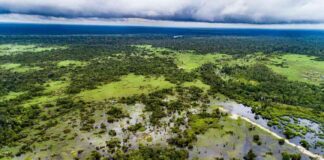The Chocolate Conundrum: Climate Change’s Sweet Impact
Imagine walking through the lush, tropical nations of Côte d’Ivoire, Ghana, Cameroon, and Nigeria, where rows of cacao trees flourish under the sun, bearing pods filled with precious beans. These humble beans, once harvested and transformed through meticulous processing, become the delectable treat that has captivated taste buds worldwide for centuries—chocolate. A beloved indulgence, particularly on Valentine’s Day, chocolate has long been a symbol of love and affection. However, behind its sweet facade lies a bitter truth: the rising cost of chocolate is deeply intertwined with the harrowing effects of climate change.
In recent reports published, it was revealed that the increasing temperatures brought about by climate change are pushing the cacao-growing regions of West Africa beyond their optimal conditions. As a result, the countries at the heart of the world’s chocolate supply chain are experiencing significant challenges during their primary harvest seasons. The impact of warming is not merely a threat to chocolate production but serves as a stark reminder of the pervasive influence of climate change on our daily lives.
The Climate Crisis: A Threat to Cocoa Production
One of the reports, penned by Kristina Dahl, the vice president for science at Climate Central, highlighted how human-induced warming is disrupting the delicate balance required for cacao trees to thrive. In the tropical regions where cacao is cultivated, exposure to temperatures exceeding 89.6 degrees Fahrenheit can lead to water stress, hinder plant growth, and diminish the quality and quantity of cacao beans produced. This shift in climate patterns has significantly impacted the cacao-producing areas in West Africa, leading to disastrous harvests and record-high cocoa prices.
The research delves into the intricate relationship between climate change and chocolate production, shedding light on the challenges faced by farmers like Emmanuel Essah-Mensah in Ghana. Essah-Mensah, a cocoa grower, laments the profound impact of droughts on cocoa plants, resulting in a drastic decline in income for farmers across the region. The struggle faced by these farmers underscores the urgent need for sustainable practices and climate-conscious policies to safeguard the future of chocolate production.
The Ripple Effect: From Farmers to Consumers
The repercussions of climate change extend beyond the cacao fields, reaching consumers worldwide through soaring chocolate prices. The nonprofit Christian Aid’s report details how extreme weather conditions in West Africa led to a sharp decline in cocoa production, culminating in a spike in chocolate costs. Global cocoa prices rose by a staggering 144 percent, signaling a significant shift in the chocolate industry’s economic landscape.
As the cost of cocoa production continues to rise, consumers are likely to bear the brunt of these price hikes. Economists like Alla Semenova warn that escalating producer prices will inevitably translate into higher consumer prices, impacting chocolate lovers around the globe. In a world where chocolate remains a beloved indulgence, the implications of climate change on its availability and affordability are cause for concern.
As the chocolate industry grapples with the challenges posed by climate change, chocolatiers are exploring innovative solutions to adapt to evolving conditions. Companies like Mars and Hershey are pioneering new recipes that reduce or eliminate cocoa content, offering consumers alternative treats in response to rising prices. This shift in product offerings reflects a broader trend in the confectionery sector as manufacturers navigate the complexities of a changing climate.
In conclusion, the story of chocolate’s journey from cacao tree to decadent treat is intertwined with the evolving narrative of climate change. The challenges faced by cocoa farmers, the rising cost of chocolate, and the industry’s adaptation to changing conditions underscore the urgent need for global action to mitigate the impacts of climate change. As we savor each bite of chocolate, let us remember the delicate ecosystem that sustains this beloved indulgence and strive to preserve it for future generations.














